One of the vital blessings of the Filipino is the spiritual presence of the Church – and we humbly make this presentation based on what we know and what we learn from the teachings of the Church itself. We speak from the heart, without any shred of bitterness or ill feelings against anyone, and mention personalities only in an objective manner because they discharge significant roles in our nation’s story.
On November 20, an article appeared in the Inquirer signed by Church and Civic personalities entitled ‘We Reject a Morally Bankrupt Government’. In finance a man is bankrupt if he has no money, swamped by debts and liabilities. In like manner a government is bankrupt if its basic actuations are bereft of Moral Law. Government exists for Man, not Man for Government. Political authority has God for its first source and final end – from God to Man, from Man to Government, from Governance to God again. Nations under such moral order choose leaders who in turn exercise authority to govern thru the principles of subsidiarity and solidarity with people for their common good. It is from moral foundation that political authority derives legitimacy to govern, to render justice, to respect rights and to impose obligations. Legitimate governance does not stem from distorted elections that cheat the people to an honest count. It does not flow from pervaded thirst for money, and it can not and should never emanate from betrayal of public trust, to hide wrongdoing or evade accountability.
When Gloria Macapagal Arroyo first took office as President in January 200l, she proclaimed before a cheering crowd at EDSA II that she would usher in good governance, that she would render honest leadership by example, and ensure transparency in public transactions for public welfare.
In those early days I was named Secretary of Foreign Affairs and in cabinet meetings I sat at the right side of the President; next to me to my right sat the Secretary of Justice Hernando Perez. During one of those meetings the banner headlines in newspapers, radio, and television was IMPSA, Industrias Metalurgicas Pescarona Anonima – an Argentine Power Producing firm.
Controversy hounded that firm’s actuations. How? During the previous administration, IMPSA got a preliminary contract to rebuild and operate the CBK, Caliraya Botocan Kalayaan power from Laguna de Bay. Because it was a Build Operate Transfer project, the preliminary agreement did not require special concessions – such as a sovereign guaranty. A Sovereign guaranty is an assurance by the Philippine government that any loan gotten by IMPSA to rebuild the power project be paid by the government in case of default. Thus, good as cash – and the banks would readily lend. IMPSA sought this government guarantee because they lacked money – but they were denied by the previous administration, despite the reported lobby money offered by IMPSA of l4 million dollars to secure the same. No sovereign guaranty, no money, no money, no final approval to undertake the project. IMPSA was getting desperate.
Then EDSA ll erupted….and a new government came to power. In that cabinet meeting Secretary Nani Perez whispered to me “Alam mo pare, tinawagan ako niyan sa hating gabi (Referring to President Gloria seated on left) at inutosan niya ako na aprobahan ko yang IMPSA.” I sat immobile and looked at him for confirmation. He gazed back and nodded his head.
There seemed no need for further words. I sat pensively back and the vision of EDSA II inaugurating a new president barely a few weeks ago came back to mind…so early yet so seemingly sad. In the days that followed a paper trail was found and a case was filed at the Ombudsman, but only against Secretary Perez. Sad.
That was the first Phase of Gloria Arroyo’s presidency. In 2003 she declared that in order to unite the nation she would not run a new term but she later changed her mind and ran in 2004.
There are a number of devastating events that forever marred the elections.. Let me just reiterate two. The first - the diversion of more than P720 million pesos intended for farmers’ fertilizer to selected governors and congressmen. This was done thru Undersecretary Jocjock Bolante to ensure the Presidential victory in the election, a matter of public record, investigated by the Commission on Audit, but until now no one held responsible, no one punished.
The second comprises the hello Garci revelations.They rocked the nation and have not really died down because there exits no rational closure -- and the painful truth contained in the tapes will continue to haunt us until we face reality. They reveal not just one or two but fifteen conversations between the President and Commissioner Garcillano, about elections, on how to ensure victory by over a million votes, conducted while the national tally was on going, their voices identified by sound experts, the details of the two hour long tapes so varied that invention remains virtually impossible.
I remember how in l978 when LABAN under Ninoy Aquino’e initiative dared to fight the KBL under Marcos. A day before elections an American asked how long it would take to know the results of the tally. A friend quipped “I know that in the US it only takes two hours to get the official results. Here in the Philippines we know the result two days before elections!’ it seems that in 2004 contest - some people already knew what the results would be two months before election upon the appointment of a certain Comelec official.
In the last quarter of 2005 citizens from diverse groups got together and organized the Citizens’ Congress for Truth and Accountability, CCTA. We convened and received evidence, One of the witnesses was a peasant from Palo Leyte. Richard Margallo, who came in a wheelchair because he still suffered from bullet wounds. He testified under oath that he was the head of San Agustin Farmer Beneficiaries Multi Purpose Cooperative. The Department of Agrarian Reform (DAR) had previously awarded land to six of their members, so they planned a “balik uma” gathering celebration of more than 50 families. At 5 AM of November 2l, the farmers were already up and about preparing food – when without warning, they were peppered with a volley of gunfire. The farmers shouted that they were unarmed civilians but the shooting continued. Five grenades where also hurled at them. Seven farmers died on the spot, including a woman seven months pregnant. More than ten others were seriously injured.
When the firing stopped, the perpetrators moved to the hut prepared for the occasion. The attackers were in military uniforms and combat boots, apparently in full battle gear, with faces concealed by bonnets, later identified as members of the l9th Infantry Battalion Philippine Army (IBPA) Once inside the hut, the soldiers ordered the farmers to stretch face down and started kicking their backs with boots. Then they accused the farmers of being members of the NPA. The farmers denied the charges, even as they pleaded for medical help. A certain Col.Louie Lagoy later admitted that the attack came from elements of the l9th Battalion but claimed that what transpired was not a massacre but a legitimate encounter between a rebel group and the military.
That event is not an isolated case, Hundreds of similar tragedies have happened in other parts of the Visayas, Luzon, and Mindanao. Killings, disappearances, torture, and enforced confinements.
Government says that these happenings are not intended or tolerated and do not constitute a policy, only isolated instances. Such claim is a feint echo of the defenses put up by law enforcement agencies during the dark days of martial law, but even before the tragedy of the farmers in Leyte, in the early days of this administration, Representative Satur Ocampo had already brought the matter of extrajudicial occurrences to President Gloria herself. She was asked not only as president but also as commander-in-chief to act in order to stop them. Seven years have gone by - yet these wanton abuses against basic human rights have not mitigated, Instead the series of abuse have generated a pattern – so much so that even international bodies and foreign personalities themselves have denounced their deeds.
This government has imposed other grand designs of deception intended to mislead people or deny them their rights to know. CHACHA, Calibrated Preemptive Response, Executive Order 464, Emergency Rule under EO1017 – all were found deficient by the Supreme Court but until today the executive does not seem to honor them honestly. Only last Friday, January 18, several groups of farmers, civic sectors, media, etc., held a candle march to Edsa shrine where fire trucks and police were already waiting. They prevented us to set foot on EDSA Shrine which ironically symbolizes freedom.
In the 1970’s, when Richard Nixon allowed his cohorts to illegally break into Watergate and the men who did so were jailed, Nixon tried to cover up by buying their silence. When wire taps in the White House were discovered, Nixon again covered up by having portions of the tapes deleted. Here in the Philippines, the electoral fraud in 2004 contest were covered up from the onset –during the national canvassing of votes in congress, by denying the repeated motions of the lawyer of FPJ to show the glaring discrepancies between the election returns and the Certificates of Canvass. Motion to produce elections returns of Lanao del Sur. Denied but noted.. Observation to show fundamental defect, Noted. Move to examine, Noted. Motion to verity. Noted. All noted until the exasperated FPJ counsel rose in protest and in righteous indignation, walked out of the proceedings.
To suppress airing of legitimate dissent, police are utilized to bludgeon helpless citizens under an illegal CPR. To prevent government officials like Romulo Neri from testifying in the aborted ZTE contract, they wrongly invoke Executive Privilege.
Under this regime as in ZTE, bribery has become rampant, dole out of money seems to be the name of the game, Not only to cover past deeds but to influence future actuations as well. We often hear of envelopes distributed to congressmen, envelopes given to Governors, envelopes meted out to the military – but it seems unthinkable that public officials would also send envelopes containing money to some bishops themselves, as reported in the past, in this very complex itself.
Excellencies, I speak as a humble member of the flock to his shepherds. We face a deepening crisis that may doom us to perdition. Did we change governments in 200l only to degrade Filipino values further? Did we lift the death penalty only to resort to extrajudicial killings and enforced disappearances? Did we preach a better tomorrow only to become one of the most corrupt amongst nations in this part of the world? Have we removed the vision of hope enshrined by real honesty and hard work of our forefathers and beckoned in its stead the evils of mass briberies, wanton suppression and bad education? Are we going to face another election in 2010 under the same corrupt system?
What is expected of us? What are we to do – we the laity and you the hierarchy of the Church? How do we respond to the deepening challenges? The following suggest themselves
l. Remain silent, do nothing. By such passivity we ignore the counsel of that eminent statesman Edmund Burke who said “for evil to worsen it takes only good men to do nothing.”
2. Declare that since we will have elections in 20l0, might as well let the remaining two years and three months pass by and wait for new directions in governance.
3. Speak out the truth pursuant to Moral Law.
The first option speaks for itself and needs no explanation except to add that silence is tacit adherence to the wrongs done to the people. The second follows the line of least resistance but resolves nothing. Those who gave credence to the President Gloria’s announcement in 2003 that she would not run to unite the nation were proven wrong, and those who believed that election in 2004 would change the nation’s course for the better were gravely disappointed. Although the initiative of Cha Cha seems gone, talks are already rife that a constituent assembly will be called in March this year. And although the infamous attempt to impose the ZTE was aborted, the details of the giant transmission firm, TRANSCO, ten times bigger than ZTE, have yet to be given to the public, again seemingly oblivious of the people’s right to know.
The third option then seems a viable course.
Let us take a stand because it is right. Let us speak because it is just. Let us adhere to the Moral guidance of the Church. In the case of Richard Nixon, many leaders advised him to take the honorable way and resign from office. Here in the Philippines, we in civic society also believe that GMA should resign.
It is not only right. It is peaceful. It is moral.

JULY 4, 2008
VIDEO CLIP- VPTG SPEECH AT CENPEG'S CONFEST
MESSAGE BOARD
> New Video Presentation. Pictures taken during the launching.
>The "Fight for the Filipino" Book Launching was a huge success. Thanks to all your support!
> The book will be available in National Book Store. you may place your order thru their website. www.nationalbookstore.com
>The Academic Publishing Co. also accepts order and they deliver. Call 9125966. Look for Ms. Lani.
FIGHT FOR THE FILIPINO!
an autobigraphy of Tito Guingona
>The "Fight for the Filipino" Book Launching was a huge success. Thanks to all your support!
> The book will be available in National Book Store. you may place your order thru their website. www.nationalbookstore.com
>The Academic Publishing Co. also accepts order and they deliver. Call 9125966. Look for Ms. Lani.
FIGHT FOR THE FILIPINO!
an autobigraphy of Tito Guingona
VIDEO PRESENTATION
Book Review on "Fight for the Filipino"
Patriot and Activist
By
Carmen Guerrero Nakpil
Only a man “with soul so dead”, wrote the English poet, does not love his native land. All of us claim to love our country. But few love it and its people with the passionate activism and militancy of Teofisto Guingona, Jr. His autobiography, “Fight for the Filipino” is a treatise on patriotism.
In different form and roles, Tito Guingona has been a constant presence in our national life. At different times, he has been a member of the 1971 Constitutional Convention, Chairman of the Commission on Audit, member of the Philippine Senate, Executive Secretary and Secretary of both of Foreign Affairs and of Justice, Vice President of the Republic and Ambassador to the People’s Republic of China. But those are only his formal titles. And, outside of our knowledge of civics and government positions, they tell us very little about Tito Guingona’s total commitment or emotional dynamism. For instance, it is only the last chapter of his 346-page biography that we learn of his latest entitlement to a charge of rebellion earned one afternoon, at the Manila Peninsula Hotel, where he was tear-gassed, arrested, handcuffed and detained.
His saga of fighting for the Filipino begins when he was a 12-year old boy who tagged along on the historic trek taken by President Quezon, his family and some members of his family, including Tito’s father, Commissioner for Mindanao and Sulu, Guingona from Northern Lanao to Bukidnon on the way to Australia in 1942.
It runs through, in vivid detail, through his years as a young student and a neophyte lawyer’s advocacy against the Parity Agreement and the U.S. Military Bases; through his stint in the making of the 1973 Constitution with concomitant arrest and detention during Martial Law; his colorful experiences with Mindanao and Manila partisan politics; his travails and policy differences in the cabinet; his frequent denunciations of anti-Filipino policies and projects; and lastly, his denunciation of a sitting President which caused a regime change.
But I must allow the readers of “Fight for the Filipino”, to discover for themselves the intriguing bits of Philippine history that Tito Guingona describes in the fast-paced, candid, conversational prose of his memoirs. For instance, the incident that happened, only four days after Gloria Arroyo’s take over of Malacañang in 2001, when the new Secretary of Justice, Hernando Perez, whispered in his ear in Tagalog, “She phoned me at midnight to order me to sign the IMPSA contract.” (an anomalous Argentinean contract which President Joseph Estrada had refused to sign because of its sovereign guarantee clause)
There are many other anecdotes and vignettes in this autobiography which makes it, more than intimate personal history, a history of the Philippines and a record of the events and personages of the last 80 years. It is also a manual for the younger generations on how to honor, love and defend this country and its people. There are few better teachers of patriotism than Teofisto (Tito) Guingona, Jr.
Story-telling – the Guingona Way
by
Eggie Apostol
Teofisto Guingona, Jr., one-time Vice-President of the Philippines has many stories to tell. And he tells them in great detail in his book “Fight for the Filipinos”
The stories are so highly detailed that one suspects Tito Guingona keeps a diary. Does he? I have not been able to ask him.
If he doesn’t, then we can only say he has a fantastic memory. And it is just as well for the telling of his life is like a recollection of our nation’s history.
Focus is, of course, on Mindanao – where his own father like him served as senator and later Commissioner for Mindanao and Sulu.
For those who lived all their lives in Luzon (or in the Visayas for that matter) the goings-on in Mindanao are like happenings in a foreign country. Because the country is mostly Christian but Mindanao has a sizeable number of Muslims (nine thousand about 50 years ago) mostly due to its proximity to Borneo and Indonesia.
One cannot help but envy the Guingona family for growing-up in the most beautiful part of the country – the Lake Lanao area.
This was so beautiful that when President Quezon saw it he asked that a branch of the Manila Hotel be built there. Which was done.
Although his family was anchored in Mindanao, Guingona studied in the Ateneo de Manila so that later in life he hobnobbed with Raul Manglapus, Diosdado Macapagal, Joe Calderon and Caesar Espiritu, Carlos Garcia and Jun Puyat. When problems came up about the Mindanao area he was always the Mindanao expert for solutions.
Guingona relates during Marcos’ martial rule:”one evening over a secretive dinner, where Fathers Horacio de la Costa and Jaime Bulatao were present, one of our conservative members of the group said: “The real response to martial rule is rebellion, but I’d like to know from our religious Fathers here – whether rebellion is morally justified?” The question was a riser; it was not said in a jest, and one of the priests curtly replied “Don’t worry, we’ll find a way to justify it.” That broke the ice and resulted in laughter.
Guingona’s life had its share of ironies. Before EDSA I he joined Cory in boycotting products linked to Malacañan, “I challenge the crowd not to pay their Meralco bill. Seven days later after our victory with Cory she appointed me president of Meralco. So I called for another big meeting and told the people ”Times have changed – pay your Meralco bills!”
Guingona liked to encourage better relations with Chinese in the Philippines. He submitted some suggestions: 1) Enhance herbal medicine in the Philippines, with Chinese help 2) Plant cassava or cash crops between spaces of coconut trees. 3) generates jobs by adopting the policy of giving value added to native products 4) Encourage technology connected to giving added value to coconut, fruits and fish; 5) encourage tourism by building necessary infrastructures 6) implement joint economic ventures.
Readers will be reminded that Guingona was a political activist from the start. When he was made Chairman of the Commission on Audit he was also a peace negotiator. When President Ramos made him executive secretary he grappled with the ADC and Jai Alai and the Flor Contemplacion case. He actively joined the fight for justice in the Vizconde massacre, the Jalosjos case, the Fr. Shay Cullen problem, the Maysilo Estate case, the Alfredo Tiongco case, U.S. property claim in Fort Bonifacio, the Textbook scam, the Visiting Forces Agreement, the WTO and GATT.
As Vice-President and Secretary of Foreign Affairs he was involved in 9/11 and the VFA, the IMPSA controversy, concern for the OFW’s and attending to foreign travel commitments. He differed with Malacañang in in pursuing OFW and Steel mill programs. He said No to Bush’s war in Iraq.
At book’s end, Guingona is very much in a negative mode: He sees in the Gloria Arroyo regime much that he finds dishonest. He had been asked by President Arroyo to become the new Ambassador to China which he accepted.
But the “Hello Garci” tapes was unraveled and proved that President Arroyo had tampered with the elections. Guingona did not want to continue with his new assignment and resigned.
“We must reform” is his current and latest plan.
INVITATION
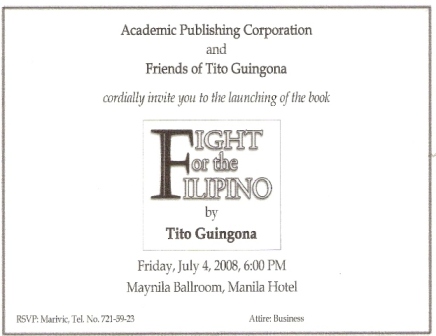
BOOK

Pls. call us for resevation.
BOOKS
THE GALLANT FILIPINO
A nation is poorer by so much everytime one of its heroes passes into oblivion. For as Tito Guingona, Jr. writes "the true treasures of the Filipino are not gold or silver" They are the men and women whose heroic lives would bring back to us in a book. And so Tito Guingona has written The Gallant Filipino...
LABAN - VOICE OF RESISTANCE
On Sept. 21, 1972 Ferdinand E. Marcos imposed martial rule in the Philippines. It marked the beginning of a black chapter in the nation's story. On Aug. 21, 1983 they killed Benigno S. Aquino. His death inflamed the nation, and it marked the beginning of the end for Mr. Marcos. From then on the people demanded back their rights. they rallied. they marched. They defied the guns and tanks and bullets of the dictator - in the end, they defended the soldiers who rose in revolution. In that crucial hour, the nation triumphed...
FACE THE CHALLENGE
To the small Filipino businessman - whose continuing strife to survive deserves sustained support. May he eventually succeed - if not under the present economic system - then in another more responsive to the nation's needs!
A nation is poorer by so much everytime one of its heroes passes into oblivion. For as Tito Guingona, Jr. writes "the true treasures of the Filipino are not gold or silver" They are the men and women whose heroic lives would bring back to us in a book. And so Tito Guingona has written The Gallant Filipino...
LABAN - VOICE OF RESISTANCE
On Sept. 21, 1972 Ferdinand E. Marcos imposed martial rule in the Philippines. It marked the beginning of a black chapter in the nation's story. On Aug. 21, 1983 they killed Benigno S. Aquino. His death inflamed the nation, and it marked the beginning of the end for Mr. Marcos. From then on the people demanded back their rights. they rallied. they marched. They defied the guns and tanks and bullets of the dictator - in the end, they defended the soldiers who rose in revolution. In that crucial hour, the nation triumphed...
FACE THE CHALLENGE
To the small Filipino businessman - whose continuing strife to survive deserves sustained support. May he eventually succeed - if not under the present economic system - then in another more responsive to the nation's needs!
Vice President
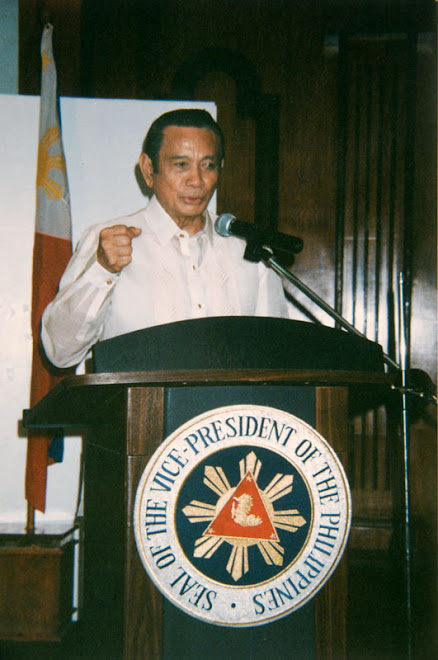
Tito Profile
Teofisto T. Guingona, Jr. reached a new high in his stellar career when both Houses of Congress confirmed his nomination as Vice President of the Philippines by President Gloria Macapagal Arroyo.
Born in San Juan, Rizal on July 4, 1928 to Teofisto Guingona, Sr., a former assemblyman, senator, judge and commissioner from Guimaras, Iloilo and Josefa Tayko of Siaton, Negros Oriental, he grew up in Mindanao where he completed his elementary schooling with honors in Ateneo de Cagayan.
He pursued his studies at the Ateneo de Manila University as a working student, teaching history and political science while taking up courses in law and economics. He took up special studies in Public Administration, Economics, Sociology and Audit. After graduation, Tito went into business and became a Governor of the Development Bank of the Philippines and President of the Chamber of Commerce of the Philippines.
Tito was a delegate to the 1971 Constitutional Convention and when Martial Law was declared in 1972, he staunchly resisted the abuses of the regime, serving as a human rights lawyer and defender of the oppressed. He founded SANDATA and became the honorary chairman of BANDILA, two mass-based organizations dedicated to social and economic reforms. Because of his opposition to martial rule he was jailed twice, first in 1972 and then in 1978.
When the dictator was ousted, the new President appointed Tito as Chairman of the Commission on Audit where he gained renown as a no-nonsense graft buster. He did not stay long in the Commission on Audit, however, for he was drafted to run for a Senate seat. In the Senate, Tito was Senate President Pro-tempore and Majority Leader. He also chaired the Blue Ribbon Committee.
Tito’s concern for the welfare of his kababayans in Mindanao is apparent when he served as director and chairman of the Mindanao Development Authority and the Mindanao Labor Management Advisory Council respectively.
Born in San Juan, Rizal on July 4, 1928 to Teofisto Guingona, Sr., a former assemblyman, senator, judge and commissioner from Guimaras, Iloilo and Josefa Tayko of Siaton, Negros Oriental, he grew up in Mindanao where he completed his elementary schooling with honors in Ateneo de Cagayan.
He pursued his studies at the Ateneo de Manila University as a working student, teaching history and political science while taking up courses in law and economics. He took up special studies in Public Administration, Economics, Sociology and Audit. After graduation, Tito went into business and became a Governor of the Development Bank of the Philippines and President of the Chamber of Commerce of the Philippines.
Tito was a delegate to the 1971 Constitutional Convention and when Martial Law was declared in 1972, he staunchly resisted the abuses of the regime, serving as a human rights lawyer and defender of the oppressed. He founded SANDATA and became the honorary chairman of BANDILA, two mass-based organizations dedicated to social and economic reforms. Because of his opposition to martial rule he was jailed twice, first in 1972 and then in 1978.
When the dictator was ousted, the new President appointed Tito as Chairman of the Commission on Audit where he gained renown as a no-nonsense graft buster. He did not stay long in the Commission on Audit, however, for he was drafted to run for a Senate seat. In the Senate, Tito was Senate President Pro-tempore and Majority Leader. He also chaired the Blue Ribbon Committee.
Tito’s concern for the welfare of his kababayans in Mindanao is apparent when he served as director and chairman of the Mindanao Development Authority and the Mindanao Labor Management Advisory Council respectively.

the senator at work
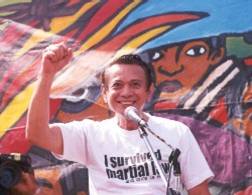
i survived martial law
Anti GMA Rally
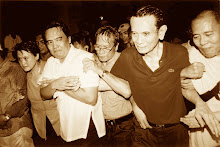
Water Canonized by the Police
About the Peninsula Seige/ An Interview with Karen Davila
Friday, April 18, 2008
Subscribe to:
Post Comments (Atom)



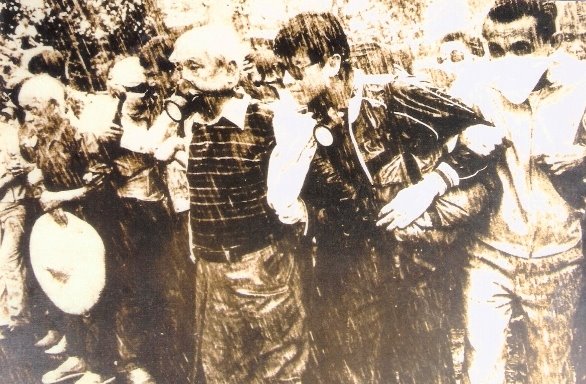


No comments:
Post a Comment